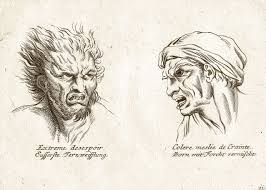physiognomy
英 [ˌfɪz.iˈɒn.ə.mi]
美 [ˌfɪz.iˈɑː.nə.mi]
- n. [地理] 地貌;外貌;面相;相面术

记忆方法
将“physiognomy”分解为“physio”和“gnomy”。想象“physio”代表与身体(physical)有关,而“gnomy”可以联想到“gnome”,即小矮人。将小矮人想象为在评估你的身体特征,如面部表情和体型,这就是“physiognomy”所描述的面相学或生理特征学。
以上内容由AI生成, 仅供参考和借鉴
中文词源
physiognomy 相面术,人相学,容貌,相貌
来自希腊语physiognomia,相面,由人的身体特征判断本性和性格,来自physo-,身体,躯体,gnomon,判断,词源同know,gnomic.因人的身体特征主要在于相貌,引申词义容貌,相貌。
英语词源
- physiognomy (n.)
- late 14c., "art of judging characters from facial features," from Old French phizonomie and directly from Late Latin physiognomia, from Greek physiognomia "the judging of a person's nature by his features," from physio- (see physio-) + gnomon (genitive gnomonos) "judge, indicator" (see gnomon). Meaning "face, countenance, features" is from c. 1400. Related: Physiognomical.
权威例句
- 1. He was fascinated by her physiognomy — the prominent nose, brooding eyes and thick hair.
- 他被她的外表——高挺的鼻梁、深邃的双眸和浓密的秀发——迷住了。
- 2. In naturalistic novels such inessential things as a minor character's physiognomy and costume are depicted in minute detail.
- 在自然主义的小说里,有些不关本质的东西,像一个次要人物的面貌和衣服之类,都描写得很详细.
- 3. When turning suddenly, he caught my gaze fastened on his physiognomy.
- 他突然转过头来, 发现我盯着看他的面貌.
- 4. Mr. Sykes entered - a tall, stout man of about fifty, comely of feature , but feeble of physiognomy.
- 赛克斯先生进来了 ― ―这人又高又胖,约莫50岁, 眉目清秀, 一副优柔寡断的相貌.
- 5. His eyes were good, but otherwise there was nothing remarkable in his physiognomy.
- 他的眼睛长得好, 其它方面倒也别无特别突出的地方.
